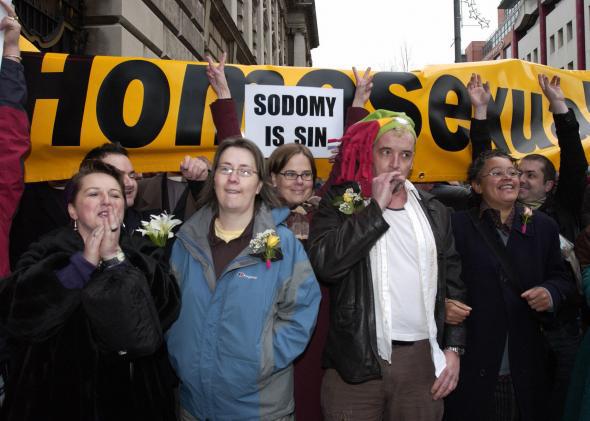A month before the Irish people gave their wholehearted support to marriage equality, the Northern Ireland Assembly voted down same-sex marriage for the fourth time. It was embarrassing then, but after the referendum in the Republic of Ireland, Northern Ireland’s status as the only nation in the British Isles willing to deny same-sex couples the right to marriage—an outpost of homophobic discrimination in Western Europe—is even more disgraceful and unjustifiable.
Northern Ireland’s ignoble status is, on one level, a product of the British political system. Marriage is a “devolved” issue, meaning that England and Wales, Scotland, and Northern Ireland have their own laws on same-sex marriage. The Marriage (Same Sex Couples) Act 2013, which introduced marriage equality to England and Wales, did not apply to Northern Ireland, although the law did specify that same-sex marriages entered into in England and Wales are recognized as civil partnerships in Northern Ireland.
Yet the absence of same-sex marriage in Northern Ireland is clearly also a matter of political unwillingness. This doesn’t come from the nationalist parties. Both Sinn Fein and the Social Democratic and Labour Party support it, as does the nonsectarian Alliance Party (although some Alliance and SDLP members were mysteriously missing during the recent vote on same-sex marriage). The problem in Northern Ireland is very much the Democratic Unionist Party.
Since it was established by Ian Paisley in 1971, the DUP has been associated with social conservatism and Protestant fundamentalism. Paisley and the DUP were behind the Save Ulster From Sodomy campaign, founded in 1977, which sought for years to prevent the decriminalization of homosexuality in Northern Ireland. The DUP opposed civil partnerships for gay and lesbian couples at the time they were made law in 2005 (and still does), just as it opposes marriage equality today.
Homophobia is inherent to the DUP. Ian Paisley Jr., a member of the U.K. parliament, showed that the apple didn’t fall very far from the tree when he said he was “repulsed” by homosexuality. Iris Robinson, wife of Northern Ireland’s first minister, called homosexuality “disgusting, loathsome, nauseating, wicked, and vile.” And Jim Wells recently resigned as the region’s health minister after saying, “You don’t bring a child up in a homosexual relationship. That … child is far more likely to be abused and neglected.”
Political homophobia is connected with religious power. Northern Irish people find themselves living under what has been called “essentially a theocratic regime,” due to the hold the Calvinist fundamentalist Free Presbyterian Church has over the DUP. A recent study found that Free Presbyterianism “remains the largest faith among both DUP members and elected representatives.” As many as 30.5 percent of DUP members are Free Presbyterians, compared with a measly 0.6 percent of the Northern Irish population at large.
Since the 1970s, Northern Ireland’s LGBTQ activists have used the court system as one path to legal and social change. Indeed, it is because of the European Court of Human Rights that homosexuality was decriminalized in Northern Ireland. In the case of Dudgeon v the United Kingdom, the court ruled that the criminalization of male homosexual acts violated Article 8 of the European Convention on Human Rights with regard to the respect for private and family life. (The plaintiff, Jeff Dudgeon, had been persecuted by Northern Irish police throughout the 1970s on account of his homosexuality.)
This month, a court in Belfast ruled against Ashers Baking Co., a Christian-run bakery that refused service to a gay activist who wanted them to make a cake that included a slogan in support of same-sex marriage.* The judge determined that a business run for profit could not use freedom of religion to exempt itself from anti-discrimination law. Right now, there is a challenge underway to the Northern Irish government’s nonrecognition of same-sex marriages conducted in other parts of the United Kingdom.
Alongside the legal route, a mass demonstration organized by the Rainbow Project, Amnesty International, and the Irish Congress of Trade Unions is planned for June 13 in Belfast. “Northern Ireland is now the last bastion of discrimination against gay people in these islands,” Amnesty’s Northern Ireland Program Director Patrick Corrigan said. “People in Northern Ireland are sick of living in a discriminatory backwater for gay people.” Faced with a sclerotic political system, the courts and the streets are, for now, the gay community’s best hopes of overturning the status quo.
*Correction, May 27, 2015: This article originally misstated that Ashers Baking Co. refused service to a gay couple. It was gay activist Gareth Lee who ordered the cake. Also, due to a photo provider error, the caption on this photo originally misstated that the people in the photo were protesting same-sex marriage. The people standing in front of the banner are supporters of same-sex marriage.
